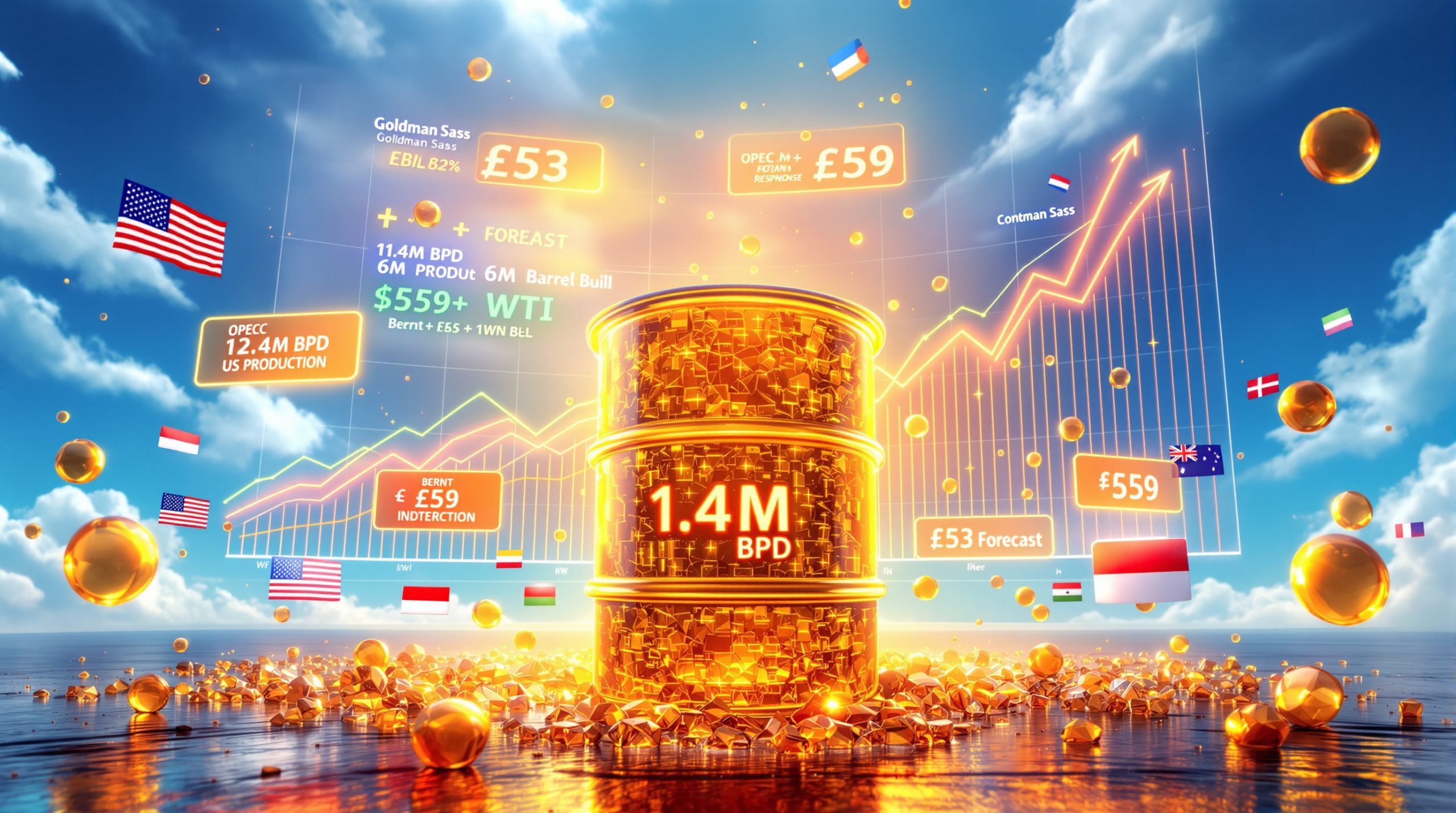What is the US Policy Change Regarding Venezuela's PDVSA Partners?
The US government has initiated a significant policy shift by notifying foreign partners of Venezuela's state oil company PDVSA that their authorizations to export Venezuelan oil and byproducts will be imminently canceled. This represents a dramatic reversal from previous policies and signals a return to a more hardline approach toward the Maduro regime.
The decision effectively terminates special licenses that had allowed several international energy companies to continue operating in Venezuela despite broader sanctions. These licenses, granted during the Biden administration, had created exceptions to the US sanctions regime in an effort to secure global oil supplies and engage diplomatically with Venezuela.
According to energy sector analysts, this policy change will immediately impact global oil supply chains that had incorporated Venezuelan crude, particularly affecting refineries specifically designed to process Venezuela's heavy oil grades.
Why is the US Revoking PDVSA Partner Authorizations?
The Trump administration is implementing a tougher stance on Venezuela as part of a broader strategy to curb migration from the country. With an estimated 7.7 million Venezuelans having fled the country since 2014 according to UN data, addressing the root causes of this migration has become a priority.
Immigration experts note that the policy aims to increase economic pressure on the Maduro government, potentially forcing political concessions that could ultimately improve conditions within Venezuela and stem the flow of migrants.
The move follows Trump's policy approach that reshaped global commodity markets earlier this year. These tariffs, ranging from 10-17.5% depending on the buyer's relationship with the US, had already begun to discourage international purchases of Venezuelan petroleum products.
This policy shift represents a complete reversal of the Biden administration's approach, which had granted exceptions to secure Venezuelan oil supplies during a period of global energy market volatility following Russia's invasion of Ukraine. Energy market analysts point out that the Biden administration had hoped these exceptions would encourage democratic reforms in Venezuela while stabilizing oil markets.
"The return to maximum pressure tactics reflects a fundamental belief that economic isolation, rather than engagement, is more likely to produce desired political outcomes in Venezuela," explains Dr. Francisco Rodriguez, a Venezuelan economist and oil policy expert.
Which Companies Are Affected by the Authorization Revocation?
The policy change impacts major international energy companies with significant investments in Venezuela's oil sector:
- Spain's Repsol, which had been importing approximately 35,000 barrels per day of Venezuelan crude oil before the recent tariffs
- Italy's Eni, which had joint ventures with PDVSA in the Orinoco Belt heavy oil region
- France's Maurel & Prom, a smaller player but strategically important for European energy supplies
- India's Reliance Industries, once Venezuela's largest single customer for crude oil
- US Global Oil Terminals, which had facilitated oil-for-debt swaps
- Chevron, America's second-largest oil company, whose license cancellation was announced separately last month
Industry analysts estimate the collective value of these companies' Venezuelan operations exceeds $20 billion, representing significant long-term investments that are now at risk.
For many of these companies, Venezuelan operations represent a small but important part of their global portfolios, with specialized refineries and infrastructure designed specifically to process Venezuela's unique heavy crude grades.
What is the Timeline for the Authorization Revocation?
Chevron was ordered to wind down operations with a deadline extended to May 27, 2025, providing the American energy giant with a 12-month transition period. This timeline allows for an orderly exit from operations that Chevron has maintained in Venezuela for nearly a century.
Industry sources indicate that most non-US companies have not yet received official notification of their specific wind-down timelines. It remains unclear if all PDVSA foreign partners will receive the same May 27 deadline or if different schedules will be implemented based on each company's specific circumstances.
Petroleum industry analysts note that most companies had already suspended imports of Venezuelan oil following Trump's imposition of secondary tariffs in January, making the formal revocation of authorizations largely symbolic for many operators.
"The extended wind-down period for Chevron suggests the administration wants to avoid immediate market disruptions while still sending a clear political message," notes Carlos Pascual, former US diplomat and energy security expert.
Oil traders indicate that the markets had already largely priced in this policy shift, with most companies having reduced their Venezuelan exposure in anticipation of tougher measures.
How Has Venezuela Responded to US Sanctions?
Venezuelan President Nicolas Maduro has vehemently criticized the sanctions, describing them as part of an "economic war" against his country. In a televised address following news of the authorization revocations, Maduro vowed to find alternative markets for Venezuelan oil.
"These sanctions target our primary economic engine, but Venezuela will not be defeated," Maduro declared to supporters in Caracas. "We have survived years of aggression and will continue to defend our sovereignty."
Venezuela's oil ministry has announced plans to redirect exports to China, Russia, and other countries less susceptible to US pressure. However, petroleum industry experts note that these alternative markets can only partially offset the loss of traditional buyers, particularly for Venezuela's specific grades of heavy crude.
The Maduro government, whose 2024 re-election was not recognized by Washington, has consistently blamed US sanctions for Venezuela's economic collapse rather than acknowledging internal policy failures. Economic indicators show Venezuela's GDP has contracted by more than 75% since 2013, with oil production falling from 3 million barrels per day to approximately 800,000 barrels currently.
Government officials in Caracas have indicated they may respond by nationalizing remaining foreign assets or imposing new restrictions on companies complying with US directives.
What Was the Previous US Policy on Venezuelan Oil?
The Biden administration had granted special authorizations to secure Venezuelan oil supplies as part of a diplomatic opening intended to encourage democratic reforms. These licenses were exceptions to the US sanction regime on Venezuela that had been implemented during Trump's first term.
The authorizations allowed refineries from Spain to India to receive Venezuelan oil through complex arrangements that often involved debt repayment rather than cash transactions. Companies like Repsol were permitted to import Venezuelan crude in exchange for refined products or to collect on outstanding debts.
This approach represented a significant shift from the "maximum pressure" strategy employed during Trump's first term. The Biden policy was predicated on the idea that limited economic engagement could provide leverage for political negotiations while addressing global energy supply challenges.
Energy security experts note that the policy was also influenced by the disruption to global market dynamics and political influences following Russia's invasion of Ukraine, with Venezuelan production seen as a potential offset to Russian barrels removed from Western markets.
The exceptions were criticized by some Venezuelan opposition figures who argued they provided financial lifelines to the Maduro government, while others viewed them as pragmatic given global energy market realities.
What Are the Global Implications of This Policy Change?
The US to revoke authorizations to foreign partners of Venezuela's PDVSA will cause disruption of global oil supply chains that had incorporated Venezuelan oil, particularly for specialized refineries designed to process heavy crude grades.
Refineries in the Gulf Coast, India, and Europe specifically configured for Venezuelan heavy crude will need to find alternative sources from producers like Canada, Mexico, or Middle Eastern countries. However, petroleum engineers note that these substitutions often require costly modifications to refining equipment.
The policy change may have targeted price impacts on specific oil markets that relied on Venezuelan crude, especially for specialized products like asphalt and petroleum coke. Industry analysts anticipate price premiums of 3-5% for comparable heavy crude grades in the short term.
Venezuela's already struggling economy will face increased pressure, with economists projecting a potential further 15-20% contraction in GDP if oil exports fall significantly. The country's current production of approximately 800,000 barrels per day could decrease further as investment dries up.
"The real challenge for global markets isn't the volume of oil affected, which is relatively small in global terms, but rather the specific qualities of Venezuelan crude that make it difficult to replace in certain applications," explains energy analyst Francisco Monaldi of Rice University's Baker Institute.
How Does This Fit Into Broader US Foreign Policy?
Secretary of State Marco Rubio has indicated that foreign companies operating in Venezuela would receive new guidance as part of the administration's Venezuela policy. This signals a coordinated approach across multiple government agencies to implement the policy shift.
The move marks a return to maximum pressure tactics against the Maduro regime, similar to strategies employed toward Iran and North Korea. Foreign policy experts note this approach aligns with the administration's preference for geopolitical shift strategies in politically-driven markets rather than engagement with authoritarian regimes.
The policy change aligns with Trump's broader focus on immigration control, with Venezuela being a significant source of migrants entering the United States. According to recent data published by Reuters, Venezuelan migration to the US increased by over 400% between 2021 and 2023.
This decision represents a significant shift from the Biden administration's approach of limited engagement and reflects a fundamental difference in foreign policy philosophy. Political analysts observe that the policy enjoys bipartisan support in Congress, particularly among representatives from Florida with large Venezuelan-American constituencies.
"This policy shift reflects a calculation that economic pressure remains the most effective tool for promoting political change in Venezuela," notes Michael Shifter, former president of the Inter-American Dialogue.
FAQs About US Sanctions on Venezuela's Oil Industry
What is PDVSA?
PDVSA (Petróleos de Venezuela, S.A.) is Venezuela's state-owned oil and natural gas company, founded in 1976 following the nationalization of the country's oil industry. It controls the world's largest proven oil reserves and historically provided up to 95% of Venezuela's export earnings.
Why is Venezuelan oil important globally?
Venezuela possesses the world's largest proven oil reserves at approximately 303 billion barrels, surpassing Saudi Arabia. Its heavy crude grades are particularly valued for certain industrial applications and specialized fuel products.
How have sanctions affected Venezuela's oil production?
Production has declined dramatically since sanctions began, from approximately 2.4 million barrels per day in 2015 to less than 800,000 barrels currently. Industry infrastructure has deteriorated due to lack of investment, maintenance issues, and brain drain.
Can other countries still buy Venezuelan oil?
Yes, but they risk secondary sanctions from the US, including potential tariffs, financial restrictions, or exclusion from US markets. Countries less vulnerable to US pressure, like China and Russia, continue limited purchases.
What alternatives do affected refineries have?
They must source similar heavy crude from other producers like Canada, Mexico, Colombia, or Middle Eastern countries, though these alternatives often require refinery modifications and typically command premium prices.
How might this impact global oil prices?
The immediate impact may be limited as markets had already adjusted to reduced Venezuelan exports. However, specific grades of heavy crude may experience temporary price increases of 3-5% until supply chains adjust.
What to Watch for Next in US-Venezuela Relations
The coming months may see potential further tightening of sanctions against Venezuela, particularly targeting financial transactions and shipment insurance for Venezuelan oil exports. Energy security analysts anticipate increased scrutiny of shipping companies transporting Venezuelan petroleum products.
Venezuela's response will likely include seeking deeper economic and political alignment with Russia, China, Iran, and other countries opposed to US policy. As highlighted by industry analysts at OGJAR, petroleum industry observers expect increased efforts to disguise the origin of Venezuelan oil through ship-to-ship transfers and documentation manipulation.
The impact on Venezuela's domestic situation and humanitarian crisis bears close monitoring, as further economic deterioration could accelerate migration flows – the very issue the policy aims to address. Humanitarian organizations report that over 7.7 million Venezuelans have already fled the country since 2014.
Oil market adjustments will occur as supply chains reconfigure, with refiners seeking alternative sources of heavy crude from Canada's oil sands, Colombia's heavy oil fields, or Middle Eastern suppliers. These commodity cycle shifts amid regulatory changes are creating new investment patterns in the energy sector.
Diplomatic initiatives from other countries, particularly Mexico, Colombia, and Brazil, may emerge to mediate the situation and prevent further deterioration of conditions in Venezuela. Regional stability concerns will likely motivate Latin American nations to seek diplomatic solutions to the crisis.
Looking ahead, predicted industry trends for 2025 shaping global energy markets suggest that this policy shift could trigger significant restructuring in how heavy crude oil is traded and processed worldwide.
Worried About Missing the Next Major Mineral Discovery?
Discovery Alert's proprietary Discovery IQ model delivers real-time notifications when significant ASX mineral discoveries are announced, transforming complex data into actionable investment insights. Explore why major mineral discoveries can lead to substantial returns by visiting Discovery Alert's dedicated discoveries page and position yourself ahead of the market with our 30-day free trial.




